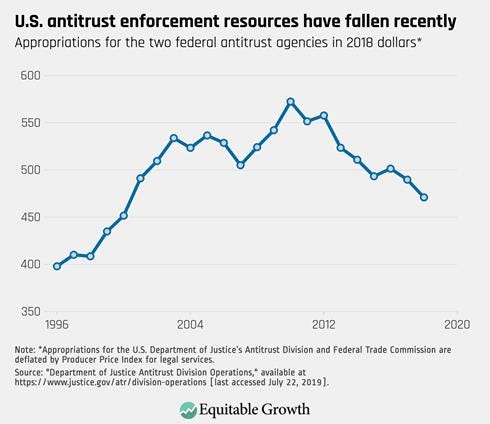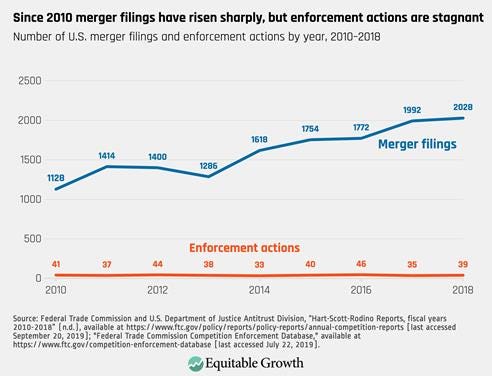 |
As politicians, the press, and the public scrutinize the tech giants and grow wary of their power, the most important organizations tasked with restraining them — the U.S. regulatory agencies — aren’t getting enough funding to do the job.
“The agencies are severely resource-constrained,” Michael Kades, an-ex FTC trial lawyer who spent 11 years at the agency, told Big Technology.
The Federal Trade Commission and Department of Justice’s antitrust division have a combined annual budget below what Facebook makes in three days. The FTC runs on less than $350 million per year, the DOJ’s antitrust division on less than $200 million. Facebook made $18 billion last quarter alone.
The funding disparity between the tech giants and their regulators leads to an unbalanced fight, current and ex-staffers said: The agencies can’t investigate the tech giants to the extent they’d like. They might shy away from complex cases fearing a resource-draining battle. And when they investigate the tech giants, they often see former colleagues with intricate knowledge of their strategy and ability to act (or lack thereof) representing these companies. Without significant budget increases, the tech giants may well continue to act unrestrained with little fear of repercussions.
“DOJ is under-resourced, FTC it’s ridiculous,” one ex DOJ-staffer told Big Technology.
This doesn’t mean these agencies are entirely hamstrung; they can typically marshall the resources to bring a clear-cut case. “They want to win,” one ex-FTC official said. “If it's really egregious, and they find that in discovery, the attorneys are going to put a case together and go after it.” But when you can only take up a limited number of cases due to resource constraints, things inevitably slip through.
“When I was there, the privacy wing had maybe 50 people, and that's probably generous. That's lawyers, support staff, everyone,” Justin Brookman, the former policy director at the FTC’s office of technology research and investigation, told Big Technology. “If they were to bring a case, that would tie up half the resources of the group. And they had two litigations ongoing and that took up most of everyone's time.” The agency’s budget has barely increased since Brookman left in 2017, while the tech giants have added trillions of dollars to their market caps.
Inside the FTC and DOJ, employees are aware of the tech giants’ ability to fight, and the corporations’ budgets tend to live inside their heads. “Facebook will have the ability to raise every single issue, if they want to,” Kades said. “It doesn't have to be a winner, doesn't have to be close to winner. If they wanted to take this position in litigation, they can make every procedural maneuver difficult, they can not cooperate on discovery, they can fight on scheduling, they don't have to win even half of those, but it would just suck up resources.” The ability to do this, not even the action itself, can impact regulators’ thinking.
 |
Agency staffers are typically mission-driven and knowingly work for salaries below private-sector rates, but the resource-rich tech giants are now poaching directly from agencies at a rate remarkable even for Washington’s revolving door between the private and public sector.
Kate Patchen, a DOJ antitrust chief, went directly to Facebook in 2018. Bryson Bachman, a high-ranking attorney in the DOJ's antitrust division, became a senior counsel at Amazon in 2018. Scott Fitzgerald, who worked in the DOJ’s antitrust division for nearly 13 years, became a corporate counsel working on regulation for Amazon this May. At the FTC, senior attorney Laura Berger moved to Microsoft in 2018 to become a privacy director for LinkedIn. And Nithan Sannappa, a well-regarded attorney in the agency’s division of privacy and identity protection left for Twitter in 2017 and is now a lawyer for Google.
The FTC declined to comment. The DOJ did not respond to an inquiry.
Hiring this type of talent gives the tech giants a major advantage in their effort to fend off regulation. Ashkan Soltani, a former chief technologist at the FTC, recalled agency lawyers hugging a former colleague who was working for the tech giants as an outside counsel as they prepared to face off in court. “They would have a really personal relationship with staff, which is kind of awkward,” he said. “And they'd know, in detail, all of the cases that the agency has currently and would be able to advise their clients whether to push hard on an issue or not.”
Ultimately, Congress is responsible for funding these agencies, and its lack of action in this regard makes its hearings and tough questioning of tech giant CEOs a little hollow. Getting Bezos to sweat in a made-for-YouTube interrogation pales in comparison to Congress’s responsibility to properly fund the regulators. None of five members of Congress contacted for this story, including some of the most theatrical in the hearings, agreed to comment.
This week on the ‘Big Technology Podcast’: Talking China With BuzzFeed News reporter Megha Rajagopalan
Listen to this week’s show for an inside look at the biggest stories in China today. Rajagopalan discusses her reporting on country’s mass incarceration of Muslims in its Xinjiang region, the state of the international press in China after many reporters have been kicked out (including her), and the geopolitical implications of the TikTok deal.
You can listen and subscribe on Apple Podcasts, Spotify, and Overcast. Transcript coming to OneZero tomorrow.

